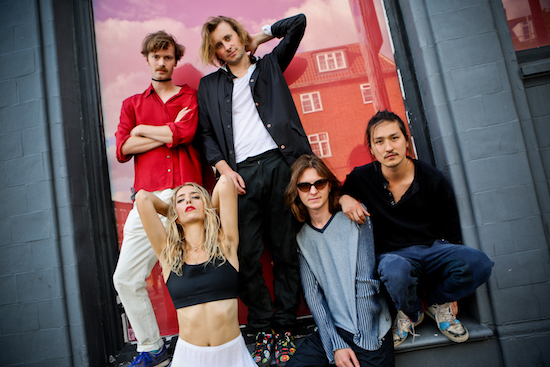Earlier this year, one of the venues at Salford’s wonderful Sounds From The Other City festival was a disused warehouse on an industrial estate. It was the sort of building that’s held together by asbestos and broken dreams – a place you’d find yourself being bludgeoned on a gritty TV crime drama.
However, that night the London-based Pumarosa flipped the drafty warehouse into a joyous, heaving mass of sweaty punters. The five-piece delivered a set of throbbing, sinewy rock – songs to dance, fuck and cry to – to a room of instant converts. The "industrial spiritual" (their words) vibe was a triumph on a wet Sunday in Salford.
I remind their lead singer, Isabel Munoz-Newsome, of the gig when we chat via Skype. "Yeah, that set was really well received – maybe Salfordians are ‘our people’." Over the past year, Pumarosa have been busy amassing many of "their" people. A trio of sublime singles (check out the slinky funk of debut ‘Priestess’, the frantic beats of ‘Cecile’ or the obtuse pop of the recently-released ‘Honey’) and the promise of a Dan Carey-produced debut album have resulted in Pumarosa being subject to all manner of buzz and hype.
Thankfully, Pumarosa are a mix of simmering substance and a dash of style. Birthed in a North London squat, the band found their sound while ensconced in a derelict Italian cinema on the Calabrian cliff tops. Starting out as duo – Isabel initially met drummer and muse Nick Owen – Pumarosa gradually added band members and evolved their complex sound. In addition Munoz-Newsome, a talented painter, does all the artwork, stage design and drives the inspiration behind the band’s compelling videography.
A pumarosa is a tropical fruit that looks like a pink avocado and tastes more like an apple, as if the heat and humidity has triggered a fructose-laced identity crisis. Pumarosa may not appear what they seem, but reveal themselves as a band who know exactly what they want to be.
How did you meet Nick and what was it about him that made you want to make music together?
Isabel Munoz-Newsome: We met in the basement of an old disused pub, which had become a creative squat. A friend of mine had told me that Nick was a brilliant drummer. I met him and we began to hang out and make music. It was very good for me, as Nick was very adept and I wasn’t. I had songs and energy but not very much musical skill. I was quite punk in my outlook.
If Nick was here, what would he say drew him to make music with you?
IM-N: He would probably say that he liked someone who turned up, had some songs and had the confidence to want to be in a band. I think he tapped into that.
I believe you met several years ago – how did your friendship develop into Pumarosa?
IM-N: That was about five years ago. We made a band at that time, called Lion Child, which was excitable, psychedelic punk. Eventually the band fizzled out. I then started to write on my own and played solo with just a guitar. Some of those songs were almost quite folky. I then began playing with Nick again and Pumarosa grew out of that partnership.
Did you have an idea of how you initially wanted Pumarosa to sound?
IM-N: Not really. I had written a bunch of new songs and I wanted more weight behind them. I wanted a band again. At the start, it was quite dark and electronic. We then met [bassist] Henry [Brown] and, as a three piece, we became a lot funkier. Then we met Tomoya [Suzuki], who plays all the electronics, and for a while, we got heavier partly due to Palma Violets letting us use their rehearsal space. That was quite a rock environment and so the music got harder. Then Neville [James] joined as the main guitarist, as I wanted freedom to move more on stage. Adding this succession of musicians allowed the music to become more complex. Each phase of the evolution has allowed us to explore.
Do your Chilean roots influence the music at all?
IM-N: Yes, a little. When I was playing on my own, I listened to a lot of Chilean music. I loved the way that vocalists like Víctor Jara would "sing out" – his voice would project at a very high level. At first when I had tried that it had felt weird, but people like Jara had mastered it.
The visual side of Pumarosa – be it the artwork, videos or live show – is hugely impressive. How important is this aspect of the band?
IM-N: It is important. I have always painted and drawn. I was at art college and studied theatre design. My mum wanted me to do that so I could get a job – and I love theatre. Therefore when I came to do music, I always wanted to design the posters. Then when we began to do larger shows, I realised I could begin to do all of that other stuff too. Concentrating on music was a big choice I had to make, as it meant not doing some other types of art. I did feel like something was missing, so there was a certain necessity in doing the visual aspects of the band.
I love the video for your second single, ‘Cecile’, which makes use of virtual reality. Are you a big fan of VR?
IM-N: I am – I have had a couple of goes on VR headsets. It’s exciting to think where we might go with that kind of technology. I came up with the concept for the video and then Rebecca [Salvadori, director] took it a million miles further. We were trying to explore desire, which is something that drives people’s creativity. Maybe with VR you will be able to create a situation where you can meet someone you have generated. Maybe relationships will move on – maybe you will be able to see someone as more of a projected idea. The video tries to explore some of those concepts.
Where do you get inspiration for your lyrics?
IM-N: They come from meeting people. They come from the experience of me being a woman at this point in our culture. It’s coming from the angles of, "Who am I meant to be?" and "what am I supposed to look like?" They aren’t really love songs. They are often portraits of people. They can be very personal and they can often be about friends and the people I love.
Is there ever a danger you can get too personal and too specific?
IM-N: Sometimes I will write about someone or an exact time with that person, and I am always surprised when the person doesn’t see that I am singing specifically about them. I almost want to them to know. However, I am careful – I would never use anyone’s name. So, the person in question is not called Cecile, put it that way.
Pumarosa seem to be a band that carries some "hype". Would you agree and, if so, does it weigh on you at all?
IM-N: I don’t have much experience of how the music industry works. In a way that’s good, as I don’t want to be measuring ourselves by something like hype. Also, hype is quite a weird concept. I don’t want to be hyped, I’d rather people wanted to come and see us because they’d heard we were really good live. Being hyped can be negative, in the sense of all there being is just hype. Nevertheless, it does feel good to get positive feedback, and to get negative feedback can be painful. I suppose you just have to learn to deal with both. We are just honoured if anyone is interested in our band.
Tell me a little bit about the new single, ‘Honey’.
IM-N: I wrote ‘Honey’ after watching Bitter Lake by Adam Curtis. He portrayed the Middle East situation in a very real way. Rather than news reportage, which is so weighted and sensational, the documentary was very human. And it made me want to write. I wanted to make a piece of music with something of that shimmering heat haze.
Is ‘Honey’ indicative of what we can expect from your debut album?
IM-N: It’s indicative in that the album is quite diverse, but to me it feels like it is clearly our sound. The album is varied; there are some closer, more delicate tracks and some that are totally wild. You’ll just have to wait and see. We are really interested for people to hear it.
Finally, Dan Carey is producing the album. Why Dan – what does he bring to the Pumarosa party?
IM-N: Well, Dan has been brilliant with us. I saw him the other night and I remembered how passionate he is. I am also like that and sometimes we can get into quite a scary place where we want to do everything. With Dan, the window to the spirit world is always open, and he is still huge fun and not at all "holier than thou". When we play live, we find a strength and we want to be able to keep that level on the records – Dan helps us do that.
The single ‘Honey’ is out now on Fiction Records. Pumarosa tour the UK in October and Europe in November; for full details and tickets, head here



